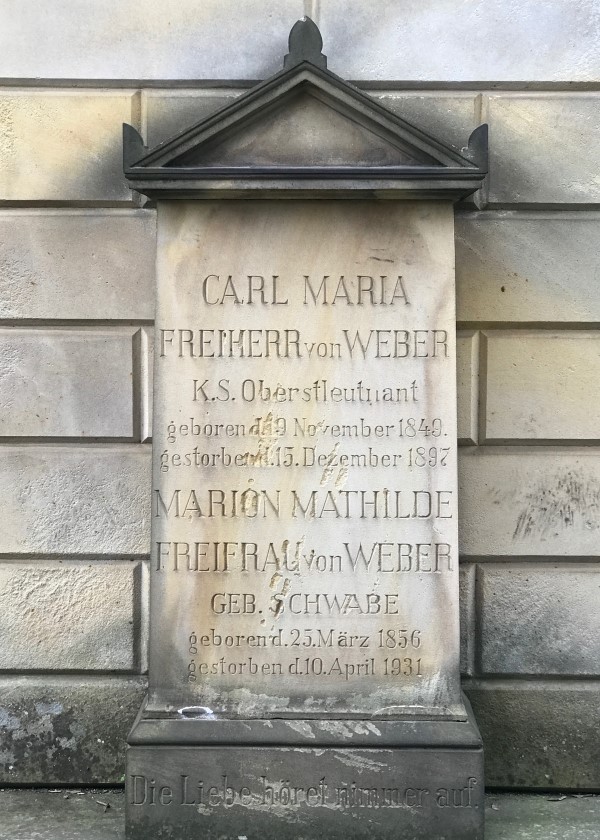- Profession: Captain in a Leipzig regiment, writer.
- See: Familytree von Weber.
- Grandson of Carl Maria von Weber (1786-1826).
- Married to Marion von Weber-Schwabe (1856-1931).
- Relation to Mahler: Die Drei Pintos, Compositions unfinished, completed by Mahler (1 composer).
- House Karl and Marion von Weber – Sebastian Bach Strasse No. 5 II.
- Year 1886, Year 1887, Year 1896 (?).
Saxon army officer and grandson of composer Carl Maria von Weber. Mahler was friendly with him and his wife, Marion von Weber (1856-1931), in Leipzig (in fact, Mahler and Marion von Weber had an affair). Through Weber, Mahler obtained the sketches and drafts of Carl Maria von Weber’s unfinished opera Die drei Pintos. Mahler’s completion of the work, with Weber’s revision of the libretto, was a huge success at its Leipzig premiere in January 1888.
In Leipzig, Mahler befriended Karl von Weber, grandson of the composer, and agreed to prepare a performing version of Carl Maria von Weber’s unfinished opera Die drei Pintos (“The Three Pintos”). Mahler transcribed and orchestrated the existing musical sketches, used parts of other Weber works, and added some composition of his own. The premiere at the Stadttheater, in January 1888, was an important occasion at which Tchaikovsky was present,as were the heads of various opera houses. The work was well-received; its success did much to raise Mahler’s public profile, and brought him financial rewards.
His involvement with the Weber family was complicated by a romantic attachment to Carl von Weber’s wife Marion which, though intense on both sides, ultimately came to nothing. At around this time Mahler discovered the German folk-poem collection Des Knaben Wunderhorn (“The Youth’s Magic Horn”), which would dominate much of his compositional output for the following 12 years.
In 1886 he published “Reise Briefe” with 53 letters from his grandfather Carl Maria von Weber (1786-1826) of his journey to London.
More
After conducting a performance of Carl Maria von Weber’s comic opera Die drei Pintos (The three Pintos) on January 20, 1888 – with Peter Illyich Tchaikovsky in the audience – Gustav Mahler (1860-1911) went home and staged his own funeral. Lighting numerous candles and surrounding his bed with flowers and wreaths received after the performance, Mahler lay in bed and imagined himself on his funeral bier. On some level, this act of theatrical morbidity undoubtedly reflects the composer’s experiences with loneliness, isolation and death, and in a therapy session with Sigmund Freud in 1910, the father of psychoanalysis had plenty to say about this gesture. Of course, we all remember that Gustav was the second of 14 children of whom only 6 survived into adulthood. He later explained that growing up meant to be part of “a funeral very other week”. However, in order to discover the real motivation behind Mahler’s thespian memorial service, we don’t have to go back to his childhood, but merely to his arrival in Leipzig in 1886.
After appointments in Bad Hall, Laibach, Iglau, Olmütz, Kassel, and Prague, the aspiring Gustav Mahler was appointed assistant conductor to Arthur Nikisch at the theater in Leipzig. In the course of getting to know his environment, Mahler met a captain in the Saxon army who turned out to be the grandson of Carl Maria von Weber, an essential musical figure in the development of Romantic opera in Germany. Apparently, Carl von Weber was in possession of musical sketches for Die drei Pintos, an unfinished opera by his grandfather. Carl and Gustav quickly agreed to bring this work to completion, and Mahler began to transcribe and orchestrate these sketches. While he was feeling his way around these musical drafts, however, he was also feeling his way around Carl von Weber’s wife. Marion Mathilde von Weber-Schwabe (1856-1931), in her mid-thirties and mother of three children, was born in Manchester in 1856 as Marion Mathilde Schwabe. Her extended German-Jewish family was intricately connected to the musical and cultural life in Manchester. According to some reports, her aunt lent money to Richard Wagner, her uncle organised Chopin recitals in the greater Manchester area, and Marion once performed with Joseph Joachim in a private setting. At some point, Marion departed for Leipzig, converted to Catholicism—just as Mahler would do in 1897—and married the debonair Carl von Weber.
Once Gustav arrived at the scene, they engaged in an intensely passionate affair. He was working on the sketches during the afternoon, and she was working on rearranging his hair after midnight. Rumour had it that Gustav asked Marion to elope with him, and that he had purchased a pair of train tickets to eternal happiness. For one reason or another, however, Marion did not appear. Urban lore even suggested that a jealous Carl, looking for his philandering wife, ornamented the departing train with a variety of randomly spaced bullet holes. In either case, it soon became obvious to Gustav that Marion was not going to leave her husband and children. Conducting the reconstructed Die drei Pintos in 1888 signaled the conclusion of a project that brought him professional recognition and praise, yet it simultaneously dashed any hopes of escaping with his beloved.
The macabre staging of his own burial, as such, was the immediate reaction to this painful realisation. Apparently, Marion did follow Gustav home almost immediately, and after clearing away the flowers and wreaths, raised him from the dead! This curious little episode inspired Mahler to draft an extensive orchestral movement, originally entitled Todtenfeier (Funeral Rites). Imparting a sense of impatience and unsteadiness, this enormous funeral march would subsequently become the first movement of his “Resurrection” Symphony. According to Mahler, the movement represents “a dirge wherein the hero of my First Symphony is borne to the grave”. Since we all know that the hero of that first symphony was Mahler himself, the music (and his relationship with Marion) provides fascinating insights into the emotionally and psychologically fragile world of Gustav Mahler.
Letters
Karl von Weber an unbekannt
Dresden, 20. Dezember 1867
Incipit: –
Zusammenfassung: Sehr hübscher Brief, mit eingehenden Details über die 300ste Aufführung des Freyschütz in Dresden
Kennung: A046444 in Bearbeitung
Karl von Weber an Ida Jähns in Berlin
Dresden, 27. März 1870
Incipit: Da es mir wirklich unmöglich war
Zusammenfassung: entschuldigt sich, daß er keine Zeit hatte, um Abschied zu nehmen, holt es hiermit nach, fährt heute mit seinem Vater nach Wien
Kennung: A043581 in Bearbeitung
Karl von Weber an Robert von Puttkamer
17. Mai 1881
Incipit: –
Zusammenfassung: Angebot von Webers Flügel betr.
Kennung: A045908 in Bearbeitung
Robert von Puttkamer an Karl von Weber
31. Mai 1881
Incipit: –
Zusammenfassung: betr. Weber?Nachlaß, Annahme des Geschenks betr.?????
Kennung: A045909 in Bearbeitung
Karl von Weber an J. G. Cotta’sche Buchhandlung in Stuttgart
Dresden, 29. Januar 1883
Incipit: –
Zusammenfassung: –
Kennung: A046510 in Bearbeitung
Karl von Weber an Friedrich Wilhelm Jähns in Berlin
Dresden, 11. November 1883
Incipit: Beigehend sende ich Dir einige Tacte von Großpapa’s Hand
Zusammenfassung: schickt ihm Notenfragmente, die er unter Briefen im Nachlaß Alexander v. Webers gefunden hat und bittet bei der Rücksendung um Identifizierung
Kennung: A044441 in Bearbeitung
Karl von Weber an Friedrich Wilhelm Jähns in Berlin
Dresden, 18. November 1883
Incipit: Ich bin natürlich mit der Photographirung ganz einverstanden
Zusammenfassung: es geht um die im Brief Nr. 649 aufgefundenen Fragmente. Er bittet, sie vor Rücksendung auch seiner Schwester zeigen zu dürfen.
Kennung: A044442 in Bearbeitung
Karl von Weber an Maria von Wildenbruch in Berlin
Leipzig, 13. April 1888
Incipit: Vielen Dank für Deinen lieben Brief
Zusammenfassung: persönliche Mitteilungen und Aufführungsbericht über die “Pintos” in München und Ankündigung, daß sie noch im April auch in Dresden unter Schuch aufgeführt werden sollen.
Kennung: A046515 in Bearbeitung
Karl von Weber an Maria von Wildenbruch in Berlin
Leipzig, 12. Juli 1890
Incipit: Herzlichen Dank für Deine Anrede
Zusammenfassung: persönliche Mitteilungen über seine Familie und Mitteilung, daß er Webers Autograph der Kantate “Kampf und Sieg” der Stadt Eutin geschenkt habe als Dank für die Feierlichkeiten zur Enthüllung des Weber?Denkmals (von Paul Peterich am 1. Juli 1890)
Kennung: A046516 in Bearbeitung

Grave Karl von Weber (1849-1897) and Marion von Weber-Schwabe (1856-1931), Old Catholic cemetery, Dresden. See also Familytree von Weber.

